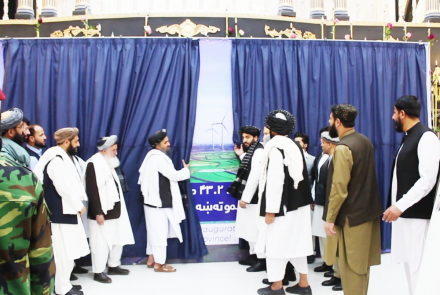A 220-megawatt wind power project, costing nearly 70 million dollars, was inaugurated in Herat with the presence of Mullah Abdul Ghani Baradar, the deputy prime minister for economic affairs.
The project is planned to be implemented in several phases, with the first phase having a production capacity of over 40 megawatts.
At the inauguration ceremony, the deputy prime minister for economic affairs stated that this project marks the first step toward the country’s self-sufficiency in sustainable domestic electricity production.
Mullah Abdul Ghani Baradar said: “This significant achievement is a major step on Afghanistan’s path to self-sufficiency in the energy sector; it not only reduces the country’s reliance on imported electricity but also creates opportunities in environmental protection, the promotion of sustainable energy, and the adoption of new technologies.”
According to the deputy prime minister, imported electricity from neighboring countries is both expensive and unreliable.
Meanwhile, Da Afghanistan Breshna Sherkat (DABS) announced that efforts are underway to produce hundreds of megawatts of electricity from various sources across the country.
Abdul Bari Omar, the head of DABS, said: “Various projects to produce more than 900 megawatts of electricity have been signed by DABS, and we are witnessing the inauguration of these projects daily, weekly, and monthly. These 900 megawatts are not the end; we have also begun energy production from coal.”
Sulaiman Jalil, head of the contracting company, stated: “Our investment began in Afghanistan’s southern provinces, including Kandahar and Helmand, and today we are active in a cement factory in the north as well as wind and solar power projects in Jalalabad and Herat. We work alongside our Afghan brothers for Afghanistan’s self-sufficiency and a better life for Afghans, and this journey will continue.”
Officials from the caretaker government stated during the ceremony that nearly all infrastructure projects in the country are funded by domestic revenues.
Din Mohammad Hanif, acting minister of economy, said: “Following the changes in the country, seventy percent of foreign aid was cut off. Currently, all our expenditures — whether development projects, salary payments, or other expenses — are entirely funded through domestic revenue and income.”
Noor Ahmad Islamjar, the governor of Herat, said: “Herat has a significant need for electricity, and I hope that with the presence of Mullah Sahib and the head of DABS, the construction of the Pul-e-Hashemi substation — a crucial substation for Herat, Shindand District, and Farah Province — will commence as soon as possible.”
Currently, Herat’s energy needs are met through imported electricity from Iran and Turkmenistan. Every year, during the colder and hotter seasons, the supply of imported electricity from these two countries decreases, leading to the shutdown of hundreds of factories in the industrial park and creating serious challenges for Herat residents.

